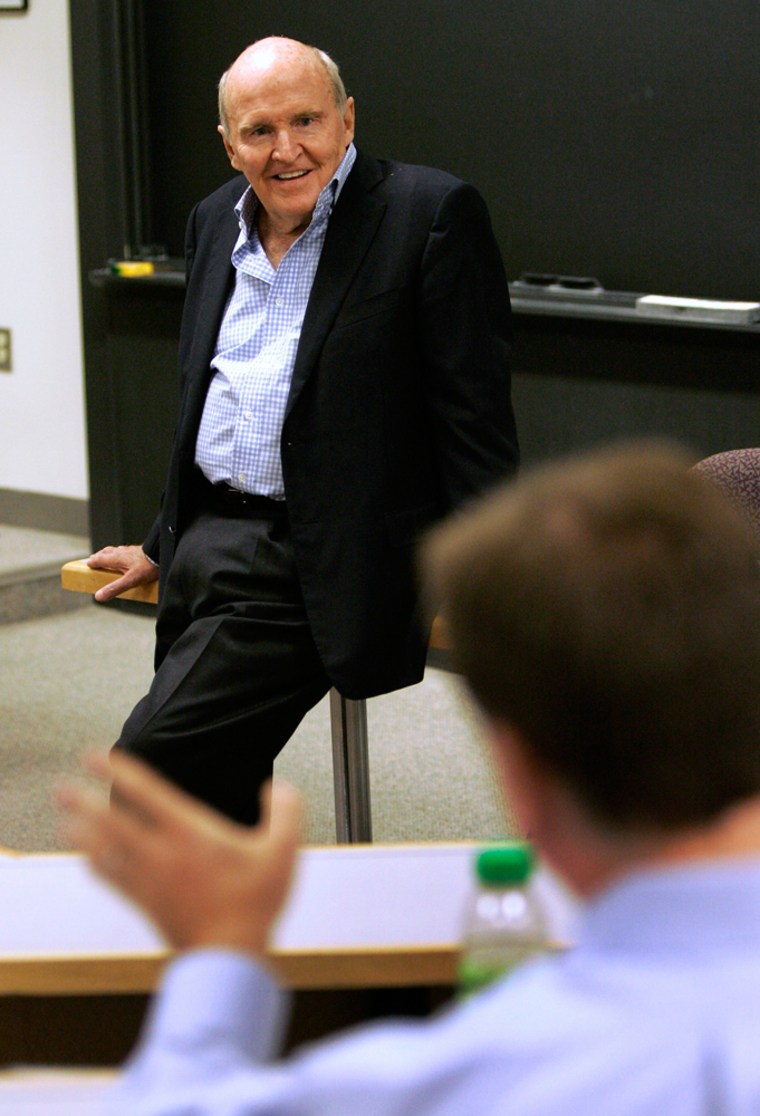"Don't fall in love with your workers," a business instructor tells a student who's launching a small startup company. "If you've got 16 employees, at least two are turkeys."
It's hardly the only piece of blunt, politically incorrect advice the charismatic teacher dishes out in a windowless basement classroom filled with 30 MBA candidates, many of them hoping to eventually become CEOs. Wearing a blue blazer and checked shirt, the baldheaded instructor stands in front of a lecture table, rather than behind, through most of the 90-minute session, sharing his management ideas with a preacher's fervor.
If it sounds like the instructor is copping an I've-seen-it-all attitude, it's because he has reason to. He's Jack Welch.
While Welch's 20-year-run run as chairman and CEO at General Electric Co. generated criticism that he was too quick to cut jobs — leading to the not-so-flattering nickname "Neutron Jack" — he also won legions of followers who regard him as a management guru with unparalleled leadership abilities and business acumen. Then there's his record of increasing GE's market value by more than $400 billion before he retired in 2001 as head of the industrial, financial services and media conglomerate.
Last month, the 70-year-old began his first classroom job, teaching an eight-session weekly course at the Massachusetts Institute of Technology's Sloan School of Management, across the Charles River from his townhouse in Boston's ritzy Beacon Hill section.
The course is titled "Conversations with Jack Welch," and it's aptly named.
Although Welch eagerly solicited students' ideas during one of his recent Wednesday afternoon sessions, the management ideas he discussed throughout the class were his alone.
Pairing up a young employee with a single mentor "is one of the stupidest ideas around in management," the instructor said, because the mentor "may be a turkey."
When negotiating a deal, tell your rival what you want the moment you sit down at the negotiating table.
"It gets the deal done faster," he said. "You totally disarm them by putting your cards out on the table. You take all the cleverness out of the game."
And don't bother trying to improve the performance of underachievers in the bottom 10 percent of the company's work force, he said. Tell them they're not suited to their jobs, and give them a way out.
"The theory is his, the opinions are his, and we are here to hear what he has to say," said student Tal Ben-Shahar, a 34-year-old former major in the Israeli Air Force who someday hopes to return to his home country to run a company. "He has a lot of experience — much more than the average professor."
The class's only required textbook is "Winning," a management guide he co-authored with his wife, Suzy Welch.
Students don't seem to mind that the class revolves so heavily around Welch.
"I sense no arrogance, or even a hint of his experience being crammed down our throats," said Paul Scearce, 42, a Lockheed Martin Corp. executive who's attending MIT on a mid-career fellowship. "It's much more about making us think and sharing his personal experience."
Amid stories of his successes, Welch doesn't overlook ill-chosen acquisitions and other setbacks from his 41-year career at GE.
"This is a guy who's succeeded, but he also failed, and he doesn't mind saying it," said Ashley Prisant, 28-year-old former Navy officer who someday hopes to manage a product distribution center.
If there's any negative about the class, it's Welch's large personality, Ben-Shahar said.
"It's quite intimidating to sit in class with Jack Welch," Ben-Shahar said.
The 30 students — including six mid-career students like Scearce — were winnowed down from 96 applicants who submitted resumes and wrote essays. The class is offered on a pass-fail basis.
Teaching outside the classroom is nothing new to Welch, a frequent lecturer to business leaders and students around the world. His goal is "to give students real practical stuff that they could go out when they leave here and use — not just theoretical stuff," Welch said.
"I hope I have enough wisdom here to impart," Welch told The Associated Press during an interview after one recent class. "Some of it they will throw away. Some of it they will think, 'It's not all perfect.' It worked for me, it might not work for them. But I believe in this system."
When Sloan School of Management Dean Richard Schmalensee approached Welch last spring about exposing students to real-world management lessons, Welch quickly agreed. He receives no compensation from MIT to teach, but sees the class as a way to gain insight from tomorrow's business leaders.
"A lot of these questions they ask may make it in some of the articles I write," he said. The Welchs co-author a regular column on management in Business Week magazine.
MIT isn't Welch's only recent move into education. He also delivers lectures at schools such as Salem State College, on Boston's North Shore.
And Welch is crossing over into sports and television. Last spring, he began appearing on the regional cable channel as a regular commentator on the Boston Red Sox.
"I have a fan's knowledge, not an expert's knowledge," Welch said.
He's noncommittal about whether he may continue teaching at MIT after his current assignment.
"I don't know about that, but this is a kick for now," he said.
